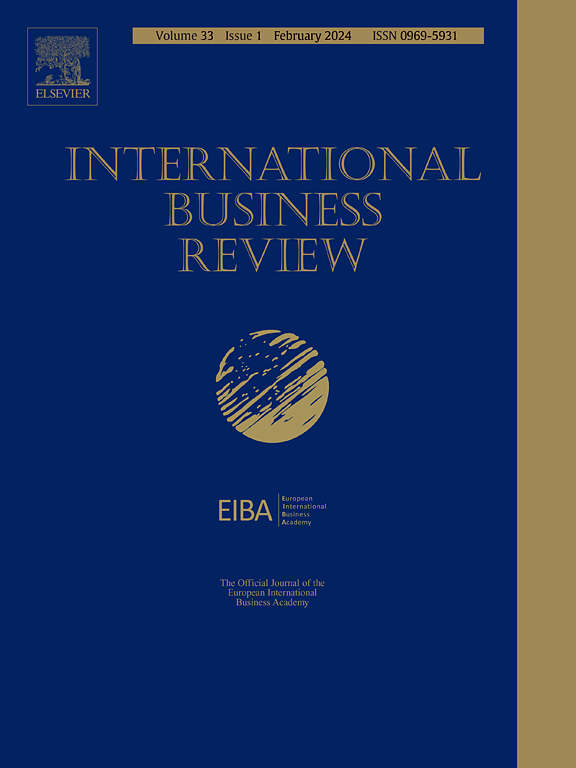International intensity, regional dispersion, and institutional distance: How a multinational configuration shapes capital structure
IF 6.1
1区 管理学
Q1 BUSINESS
引用次数: 0
Abstract
This study examines how international expansion shapes firms’ capital structure decisions. Going beyond traditional measures of internationalization, our multidimensional perspective distinguishes between the scale of foreign operations (international intensity), the breadth of geographic engagement (regional dispersion), and the institutional distance between home and host countries. Drawing on co-insurance theory and organizational institutionalism, we argue that these dimensions interact to influence firms’ leverage decisions. Using panel data from 215 listed firms across 16 European countries (2010–2020), we find that internationalization is associated with lower long-term debt levels. This negative effect is especially pronounced when firms operate across multiple global regions or in institutionally distant environments. These findings suggest that the risks and coordination challenges associated with regional dispersion and institutional heterogeneity outweigh potential diversification benefits, prompting firms to adopt more conservative capital structures. To address endogeneity, we apply a system GMM estimator and visualize key interaction effects using average marginal effects. The results underscore that, when assessing the financial consequences of global expansion, both practitioners and scholars must consider the structural configuration of a firm’s international footprint, not merely its intensity.
国际强度、区域分散与制度距离:跨国配置如何塑造资本结构
本研究探讨了国际扩张如何影响企业的资本结构决策。超越传统的国际化衡量标准,我们的多维视角区分了国外业务的规模(国际强度)、地理参与的广度(区域分散)以及母国和东道国之间的制度距离。利用共同保险理论和组织制度主义,我们认为这些维度相互作用,影响企业的杠杆决策。利用来自16个欧洲国家215家上市公司(2010-2020年)的面板数据,我们发现国际化与较低的长期债务水平相关。当公司在全球多个地区或在制度遥远的环境中运营时,这种负面影响尤为明显。这些发现表明,区域分散和制度异质性带来的风险和协调挑战超过了潜在的多元化收益,促使企业采取更保守的资本结构。为了解决内生性问题,我们应用了一个系统GMM估计器,并使用平均边际效应可视化关键交互效应。研究结果强调,在评估全球扩张的财务后果时,从业者和学者都必须考虑公司国际足迹的结构配置,而不仅仅是其强度。
本文章由计算机程序翻译,如有差异,请以英文原文为准。
求助全文
约1分钟内获得全文
求助全文
来源期刊

International Business Review
BUSINESS-
CiteScore
14.10
自引率
6.90%
发文量
95
审稿时长
62 days
期刊介绍:
The International Business Review (IBR) stands as a premier international journal within the realm of international business and proudly serves as the official publication of the European International Business Academy (EIBA). This esteemed journal publishes original and insightful papers addressing the theory and practice of international business, encompassing a broad spectrum of topics such as firms' internationalization strategies, cross-border management of operations, and comparative studies of business environments across different countries. In essence, IBR is dedicated to disseminating research that informs the international operations of firms, whether they are SMEs or large MNEs, and guides the actions of policymakers in both home and host countries. The journal warmly welcomes conceptual papers, empirical studies, and review articles, fostering contributions from various disciplines including strategy, finance, management, marketing, economics, HRM, and organizational studies. IBR embraces methodological diversity, with equal openness to papers utilizing quantitative, qualitative, or mixed-method approaches.
 求助内容:
求助内容: 应助结果提醒方式:
应助结果提醒方式:


